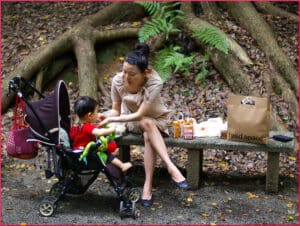
This post continues the discussion of how parents and their children talk about food and eating, in the context of a University of Michigan study. It used the Child Eating Behaviour Questionnaire and other metrics to examine the words and actions of families in an attempt to understand whether discussion of these matters makes any difference. The conclusions fell into six major areas.
The research team defined several varieties of talk. A child might do Desire/Need talk or Food Enjoyment talk. Mothers do a lot of Monitoring talk, and might engage in Overt Restriction talk, and either one might speak in the Prep/Planning mode.
Some of the findings were unexciting. For example, parents and kids talk about food at other times than just during meals. When the object of the reportage is something as ephemeral as spoken words, novelty might be in short supply. For instance:
[A]s hypothesized, child and mother food talk were positively associated with mother-reported child obesogenic eating behavior.
Should we be surprised when a study turns out to prove the hypothesis that inspired it? Is anyone astonished to learn that mothers and children who talk in the same ways about food and eating also turn out to share the same unhealthful eating habits?
Similarly, “Mother and child food talk were correlated” is hardly a world-shaking revelation. This idea is expanded upon:
We also found that similar aspects of maternal and child food talk were positively correlated… For example, mothers’ references to enjoyment of and desire/need for food were positively associated with children’s references to these same physiologic/psychological states.
The team learned that children whose mothers characterize them as highly focused on food are more likely than others to talk about food and its properties, even outside of mealtimes. And kids who talk more about enjoying food “were also rated as being likely to emotionally over-eat.” These findings would be fairly obvious to anyone who thought about it, and this type of old news inspire critics to grumble about the waste of taxpayers’ money.
It is interesting to learn that Prep/Planning talk by mothers is associated with a lower BMI in children. But… when children generate Prep/Planning talk, they are more likely to have a higher than average BMI. So there’s that.
The report explains that when a child tends to deal with emotional stress by over-eating, the mother becomes restrictive, then the child may in turn respond by becoming more upset. This is the “vicious circle” phenomenon that besets so much of human behavior.
A discouraging nugget observes that “child references to satiety were unrelated to mother-reported child satiety responsiveness.” In other words, in this area, mom’s verbalizations can influence the child in a negative way, like wanting more, but not in a positive way, like the perception of having had enough.
On the plus side, it appears that self-reporting about restrictive food talk is more closely aligned with actual behavior than some other categories of self-reporting. The report also says,
The higher prevalence of food talk outside of meals in the preschool-age years suggests a possible context for intervention during early childhood, which has been identified as a developmental period when obesity prevention interventions may be most beneficial.
In general, preschoolers talk more about food than do school-age children. Again, this is hardly a remarkable fact. In the preschool years, parents are the often the only source of both food and communication, and it’s not as if children under five have a fund of scintillating conversational topics on tap.
Your responses and feedback are welcome!
Source: “Family food talk, child eating behavior, and maternal feeding practices,” NIH.gov, 06/03/17
Photo credit: Tamaki Sono on Visualhunt/CC BY

 FAQs and Media Requests:
FAQs and Media Requests: 











